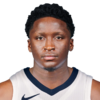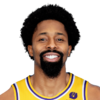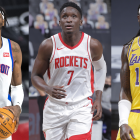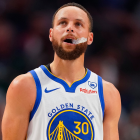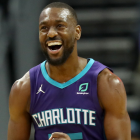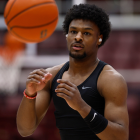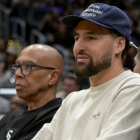
The trade deadline is an extremely useful barometer of a team's ability to accurately assess its own circumstances. In general, bad teams should be moving veterans for younger assets, while good teams can afford to be more aggressive in seeking out immediate upgrades. In practice? Trades are often made with unclear motives. The Cleveland Cavaliers wouldn't be desperately trying to trade Andre Drummond right now if they hadn't nonsensically acquired him at the 2020 deadline in the first place. As a general rule, teams sitting 26 games below .500 shouldn't trade for expensive veterans without reason to believe they're close to future contention.
But the 2021 deadline is somewhat complicated. Self-evaluation has never been more difficult in the age of COVID-19, which has in turn complicated every team's ability to plan for the future. Take the Toronto Raptors. On paper, a team nine games below .500 should probably try to move its 34-year-old star point guard on an expiring contract, but Toronto's situation is somewhat complicated. Part of the reason the Raptors are struggling is the depth they lost in an effort to clear our max 2021 cap space. They wanted to use that space on Giannis Antetokounmpo, who has since re-signed with the Bucks. Now, in a weak free-agent class, they might not have any better options than simply re-signing their own top free agents, Kyle Lowry and Norman Powell, and hoping that a return to Canada after a season spent in Florida helps them right the ship next season.
The Raptors may be the only team preparing to cross the border next season, but that doesn't mean they're the only one facing deadline uncertainty. It isn't clear whether or not the following five players are going to be traded at the deadline, but if their teams are honest with themselves about their priorities moving forward, they certainly should be.
Houston has so far driven a hard bargain for Victor Oladipo. They are asking for either a good first-round pick or a valuable young player, The Athletic's Shams Charania reports. So far, neither has been offered. In all likelihood, none will be. Oladipo has struggled in Houston, and even teams expecting him to revert to his Indiana form in a winning environment know that they can try to poach him in the offseason for free. Several potential suitors -- such as Dallas, Miami and New York -- will have significant cap space this offseason.
The Rockets can offer Oladipo more money than any other suitor, but will they want to? His health hardly warrants a five-year deal. If they were interested in paying anyone long-term money, they might simply have taken Caris LeVert in the James Harden trade instead of flipping him for Oladipo. Houston is already paying John Wall max money in the middle of a rebuild. That duo has lost the last eight games it has played together, and Kevin Porter Jr. appears destined for a starting role next season. The Rockets hardly have a reason to break the bank here, and even if they're willing to do so, there's no guarantee Oladipo even takes their money if a winner in a big market makes a similar offer.
This is a fairly straightforward case. The Rockets can either move Oladipo now for less than what they'd consider fair value, or they can get no value whatsoever when he walks in the offseason. Unless every offer comes with bad long-term money attached, Houston should pick one on the basic principle that something is better than nothing.
Will they do so? Houston values optics in trade negotiations, and dealing Oladipo for pennies on the dollar would look bad after he was a central asset in the Harden deal. Don't be surprised if the Rockets do wind up trading him for second-round picks, but in the form of a protected first-rounder that is unlikely to actually convey. Their return on the Oladipo investment is going to be significantly lower than they expected when they made the trade, but that doesn't mean they should deprive themselves of any value for a player that doesn't figure into their future.
The Nets haven't ruled him out for the season yet, but the odds of Spencer Dinwiddie returning from a partially torn ACL in time to contribute to a playoff run appear slim, and with a player option coming up, his days in Brooklyn are likely numbered. Could the Nets afford to re-sign him? Sure. Joe Tsai is worth over $10 billion. But as expensive as the Nets have become, they have made several financially-influenced decisions that might have hurt their on-court product. Garrett Temple would be a valuable rotation player for them right now if they hadn't declined his $5 million option last offseason. They are one of the few contenders not to use their mid-level exception in 2020 free agency. Even if they want Dinwiddie back, he may walk for a starting job. Brooklyn can't offer him one.
But even if Dinwiddie can't play this season, he's a valuable trade chip thanks to his Bird Rights. A team interested in re-signing him might be willing to give up a worthwhile player for that opportunity. In all likelihood, that player won't be as good as Dinwiddie, but he doesn't need to be. Brooklyn is all in on the 2021 championship. Any player that can step foot on the floor in the postseason is more valuable that one that likely won't.
Is it optimal asset management? Maybe not, but the Nets gave up four first-round picks for James Harden. They're betting on talent, and need as much of it as they can get their hands on right now. Dinwiddie does them no good from the sideline, and if they're going to lose him anyway, they might as well use his salary as a sort of trade exception that can help them absorb an expensive player from another team.
We've covered this in more depth here, but here's the abridged version: As shorthanded as the Lakers are in the frontcourt right now, that is going to change in the playoffs. Anthony Davis is going to play more minutes at center, Markieff Morris is going to play some minutes at center, and Marc Gasol remains a part of the starting lineup, which, when healthy, was dominant. That limits Montrezl Harrell's postseason value, and as the Lakers only have a few sizable salaries to offer in deals for guards, that makes him somewhat expendable.
This is especially true if the Lakers are able to land Andre Drummond on the buyout market, but even if they aren't, their need for shooting outweighs their desire for frontcourt depth. The Lakers rank 22nd in 3-point percentage and 25th in 3-point attempt rate. A lot of their offensive success last postseason relied on unsustainable shooting from a few key players. Markieff Morris is a 34.4 percent career 3-point shooter, but he jumped up to 42 percent in the 2021 playoffs. Rajon Rondo made 40 percent of his 3's, and now he plays for the Hawks. The Lakers may not get such outliers this time around. If they add enough shooting, they might not need them.
And then there's Harrell's contract. The Lakers signed him for only one guaranteed season. If he declines his player option, they can retain him using only Non-Bird rights. That limits them to offering only a 20 percent raise, or roughly $11.1 million next season. They have no method of matching a higher external offer. If they think they're going to lose him anyway, it makes sense to try to flip him for a better-fitting player for their current title defense.
The Spurs have already made it clear that they're moving off one veteran in LaMarcus Aldridge, but many of the same factors that are ending his time in San Antonio also apply to DeMar DeRozan. He is on an expiring contract, is in his 30s and the Spurs have a number of younger perimeter players who could use his shots and minutes. Here's the bonus: as San Antonio likely realized with Aldridge, there might not even be much harm in downgrading their roster this season.
The Spurs currently lead the No. 11 seeded Oklahoma City Thunder by 4.5 games in the standings. The Thunder are trying to tank, though, and the No. 12 seeded New Orleans Pelicans may be sellers at the trade deadline. That functionally guarantees that the Spurs are going to reach the play-in round no matter how the rest of the season goes. Could they rise in the standings? Possibly, but it's unlikely. The Spurs already trail No. 6 seed Portland by two games, and have vastly outperformed their point differential this season, suggesting luck in the clutch and in opponent's shooting numbers that won't last all season. In truth, the improving Mavericks are likelier to pass them than they are to pass anyone in the top six.
In a sense, it could therefore be argued that DeRozan has done his job for the Spurs. He's essentially gotten them into the play-in round no matter what happens from this point on. If that's the case, all that should matter is San Antonio's long-term plans for him. If they don't expect to re-sign him, which would appear to be the likeliest outcome given their youth movement, they should explore the trade market while they can.
Let's take a look at Jerami Grant's shooting percentages by month:
| MONTH | FG% | 3P% |
|---|---|---|
December | 47 | 36.7 |
January | 44.3 | 41.7 |
February | 41.3 | 31.3 |
March | 39.4 | 29.7 |
His volume numbers have largely remained intact. Grant is still averaging over 23 points per game. He's still creating offense in ways he never had in the past. But that continued decline in efficiency suggests that Grant might be slightly in over his head as a primary offensive option. Defenses seem to have adjusted to his pseudo stardom, and that puts Detroit in a somewhat precarious position.
Grant's year-by-year improvement has been steady. He might adjust to the adjustments he's seen and recapture the success he saw earlier this season. It's not as though Detroit's roster is giving him much help either. But even if he does turn into the player he was earlier in the season consistently, that's still somewhat dangerous for the Pistons. They are still early in a rebuild. Grant has only two years left on his contract. If he is a star, is he going to be willing to stick around for years of losing? And if he isn't a star, does it make sense for Detroit to pay for a high-end role player in his late 20's?
Ironically, the player Grant replaced in Detroit is in a somewhat similar situation. Christian Wood looks like a star in Houston. Houston's last star just bolted for Brooklyn. Overnight sensations can be just as fickle as All-Star stalwarts. Good players don't like losing.
Right now, the Pistons have a chance to duck this question entirely by dealing Grant at the peak of his value. They can let another team figure out whether or not he's a star and walk away with multiple draft picks in the process. The longer they hold on to him, the greater the risk that his shooting decline continues and lowers his value. Detroit has an opportunity to cash in on a smart signing now. If they don't? They risk outsmarting themselves by assuming a wise investment will only continue to increase his own value. That's no guarantee. A few more years losing in Detroit is a much safer bet, and the Pistons would be wise to consider aligning all of their assets on that timeline.



